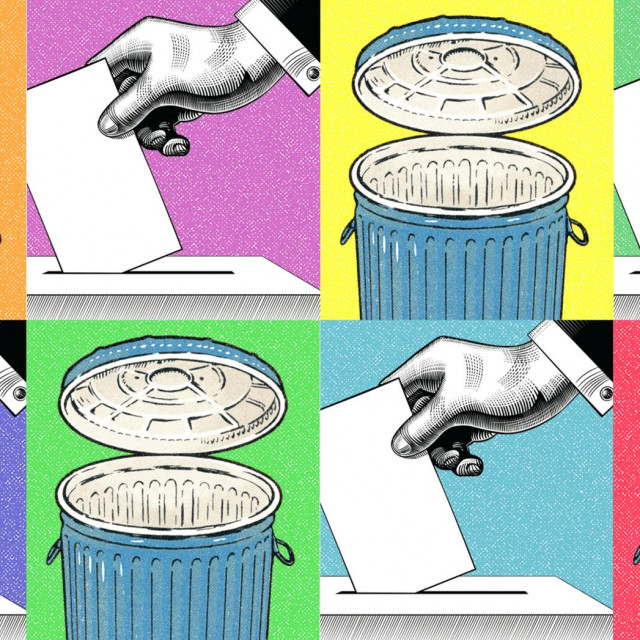Last year, at about this time, the election commission was finalizing the results of the elections for Croatian members of the European Parliament. That morning, I spoke to a colleague who, as a journalist, is not involved in politics. Commenting on the newly announced results, she resignedly uttered a sentence that stuck in my memory. "All the people I know," she said, "voted for the We Can! Coalition list." All the people I know people I know voted for the We Can! Coalition list. And yet, ”she added,“ that list got 1.8 percent. "
My colleague's resignation was understandable. Elections, in fact, are one of those awkward days in life that confront you with the fact that you live in your social, cultural and - not to run away from that word - class bubble. There are, surely, tens of thousands of Americans living the most normal social lives without having had more intense social contact with any of Trump's voters. Trump voters may be serving them coffee or refueling at the gas station, but Trump voters don't go to birthday parties, share an office or lawn in front of their house - so they easily think those voters don't exist. And then the day comes when the cardboard boxes turn over and they discover, to their regret, that this is not the case. The elections are there to bitterly remind them that they are - as in America - a thin minority. Or - as in Croatia - a very thin minority. Measurably thin: 1.8 percent.
In eight days, we in Croatia will have one such bitter, sobering "reality check". Many of you are sitting at home at the moment and do not believe that there are people who will really vote for Miroslav Škora's Homeland Movement . It's hard to imagine that anyone can trust this group of war refugees, privatization tycoons, corrupt doctors, bad entertainers, domestic bullies, and general practitioners. Yet it is almost certain that this Barnum charade of hypocrites and deserters will get its twenty mandates. That it will turn into a new "one hit wonder" of Croatian democracy, like Kolakušić in his time, and before him Pernar or Mikšić .
When a person is confronted with a measurable reality of 1.8 percent, then a rational political being begins to appear in him. And that rational political being begins to utter the most toxic sentence in the Croatian political space: and that sentence is "I will not cast my vote." And since a rational political being does not want to "cast his voice", he decides - as you have done many times - for a policy of lesser evil. This policy of lesser evil comes down to voting for the SDP so that the HDZ would not come to power. Or to vote for HDZ so that SDP would not come to power.
This policy of "lesser evil" has in the long run created a bleak, bipolar universe in which we have lived politically since the late 1990s. It is a universe that revolves around inflammatory, historiographical, but basically parapolitical identity issues: the red or white field, the ZDS or not, Tito Square or not, Istanbul and Marrakech. This binary parapolitical fault did not, of course, arise from anything: it is the result of obvious long-lasting traumas. But its long duration is evidently at least in part the result of the fact that such a rift suited the two great parties. It suited them because the fault served as a means of mobilizing them to bring dissatisfied identity relatives under their skirts, horrified by the symbolic threat of "them". We're not going to let Sieg Heil legalize us, are we? That the "reds" come to power?
To raise a star from lamps in Rijeka? To ban abortion from rapes? Through this spontaneous manipulative mechanism, the SDP and HDZ have always managed to "sell" themselves to their close relatives as a prudent choice, a lesser evil, a dam than "them". The result? The result was - and still is - economic, social and managerial sclerosis.
Every election so far has been an opportunity to change that situation. Most often, missed. And these elections are an opportunity for that. But this time the opportunity does not have to be missed. And in order not to miss it, we need to drive an opportunistic, rational political being out of our heads. We need to agree that if we are 1.8 percent, then so be it.
For at least ten years, Croatian political analysts have been complaining about the political duopoly of two party giants deprived of ideology and political content. Since 1990, Croatian leftists have complained that there is "no real left" in Croatia. For at least ten years, liberal and libertarian commentators - whose progress it is - have been arguing that there is no real liberal option in Croatia. Well, this time it's not like that. This time, Croatian voters really have a real left and a real liberal option on the political offer. These are elections in which - as my colleague Vojislav Mazzocco put it well on the Index.hr portal - "you really don't have to vote for SDP or HDZ anymore".
For a full thirty years, left-wing voters in Croatia have been frustrated by the SDP, as Viktor Ivancic put it, "playing the middle course", maddened by the SDP's concessions of airports and highways, their anti-workers policy, lack of understanding for space, their "François Toudjman L'aeroports". Now we can calmly say - who cares? Because, in the meantime, a political option has emerged on the left corner, which is all that the SDP, as a party of the former socialist technocracy, could not and cannot be. It is about the coalition We Can !, which, fortunately, did not grow out of the laboratory of political theory, but evolved on the layers of ten years of civic activism, from Warsaw, through Srđ and the law on golf, to "Manhattan on the Sava ". Although a lot of the inevitable hipster make-up has accumulated around that political group, the We Can!
This was best seen in the Zagreb Assembly, where a faction of four MPs spontaneously turned into an opposition leader, and at times it was touching to see decades-old parties and people with years of political experience look at Tomislav Tomasevic, expecting him to kick off the anti-Bandic opposition. Problem We can! there was and remains an excessive focus on Zagreb, but this election is the moment when it may cease to be so. In my constituency, for example, the second place on the list is held by Dubrovnik professor Capor , a man who has been "southern Tomasevic" for twenty years. I would really like to introduce him to the Parliament with my vote.
That's the way things are on the left. As for liberal politics, it also crystallized in this election into a clear and profiled option. This option was created by a coalition agreement between the Smart Party and a light political movement called the Party with the name and surname. Each of these two political groups carries a certain political legacy. He is a smart party of an influential think tank, a strong thinking apparatus and human potential. The party with the name and surname is the heir of the positive heritage of the original Most, the heritage of the duo of ordinary pests, Petrov and Grmoja , most shamefully betrayed. SSIIP returns the bridge story to its initial factory settings, to the revolt of enterprising provincial citizens who cannot realize their initiative because they are congested in the ten-year swamp of Hadez's "captured state". From a metropolitan perspective, it is easy to patronize this cavalry rustic and provincial light right, but to live in Vrgorac, Sinj, Omis or Murter, to be, say, a dentist, a doctor, the owner of an agrotourism or family farm, and how you should need such political umbrella.
. A party that is in coalition with a statist moloch called the HDZ cannot be called a liberal party. With the coalition of Smart, SSIIP and Focus, Croatia really got a liberal group. It doesn't necessarily have to be politically sympathetic. Personally, I would never vote for a political party that links Velimir Šonja's analysis . I would never vote for a political group that puts Davor Huić on the list - a man who scornfully slanders the public sector and grumbles that HTV shows Soviet films that "spread socialism". But aside from whether this policy is my cup of tea, I think this kind of political consolidation / profiling is desperately needed.
In Croatia, there are tens of thousands of people who are chewing on parafiscal levies, quarrels over the harassment of inspectors, slow bureaucracy, bad public procurement, unfair competition. They now have the opportunity to support a political group that articulates that revolt. One who engages in entrepreneurship, and does not recognize it, has delegitimized himself as an "entrepreneur." He will show that he belongs to the type of entrepreneur who is afraid of a change of government - he is afraid because he will lose business with the state in what is the most common form of entrepreneurship among Croats: the fake private sector that sucks public money.
In nine days, we will refill the boxes with our ballots, we will once again find out from the mouths of the Election Commission how many minorities we are in our microcosms. I would like the Croatian political landscape to be more complex when that evening passes. To be a copy of Spanish. That there are two old, ideological-historical parties that are a counterpart to the Socialists and the Partido Popular. That there is a Podemos, of which we can! sketched the name as well. And that it has a liberal middle-class resistance movement similar to the Spanish Citizens (Ciudadeños).
That would be a desirable scenario. But, of course, there is the more probable one. The one is that two of the same annoying giants deprived of ideology and ideas enter the Parliament. And with them - as the third and only novelty - a pack of swindlers hiding behind the back of the handsome singer. Uh… With such a triopolis, God save us
That would be a desirable scenario. But, of course, there is the more probable one. The one is that two of the same annoying giants deprived of ideology and ideas enter the Parliament. And with them - as the third and only novelty - a pack of swindlers hiding behind the back of the handsome singer. Uh… With such a triopolis, God save us
************************************************** ************
Comment on this blog
Comment on this blog
What the rich grand father said to his hungry eighth grandson: "Remember, the devil shit exclusively and a big pile
"Remember: the devil shit exclusively on a big pile!" Marx, Engels, and De Leon called it the Working Class, which feeds society as a whole.
What a historical irony !!!
**********************************************







Nema komentara:
Objavi komentar